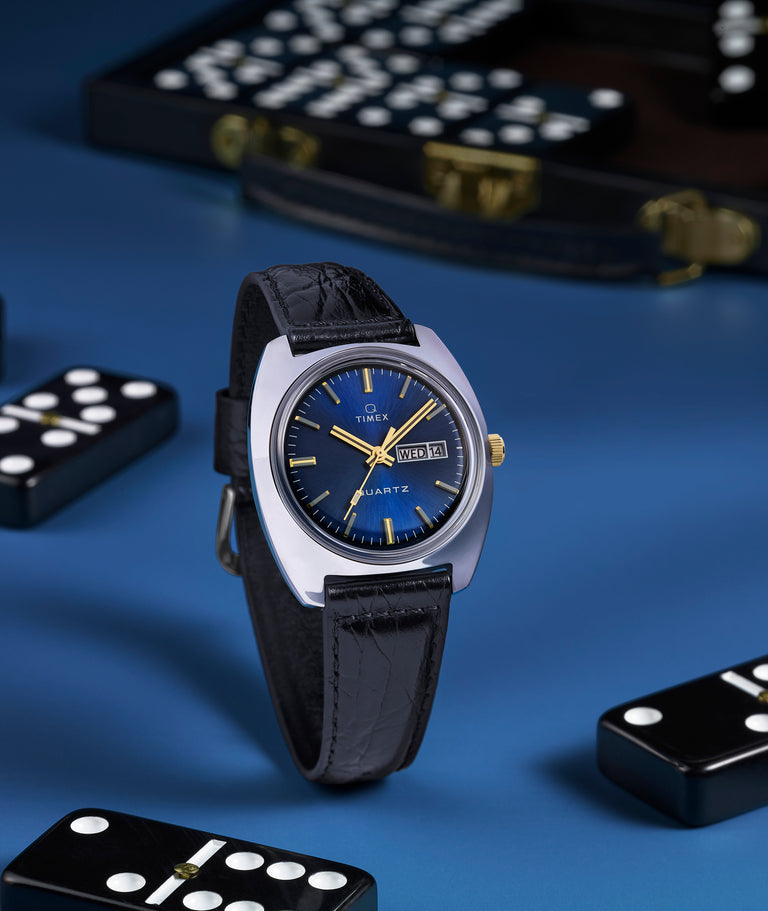Regarding types of watches, you’re likely to see a few options on the market. The most common types are mechanical and quartz. Automatic watches are also popular options, although they technically are a type of mechanical watch.
In this article, we’ll be discussing everything you need to know about quartz watches. These reliable and accurate watches use quartz crystals in their movement and have many benefits over their mechanical counterparts. Read on to learn more about what makes them tick.

What is a Quartz Watch?
A quartz watch is a watch powered by a battery or solar cell and contains a quartz crystal as part of its circuitry. Quartz wristwatches are affordable, reliable options and are considered to be more accurate than mechanical watches. They also require minimal maintenance (often only replacing the battery every 1-3 years or more).
Quartz Watches vs Other Watch Movements
As we already mentioned, there are two main types of watch movements – mechanical and quartz. Mechanical watches are powered by a wound mainspring which turns the delicate mechanisms inside using the kinetic energy of the spring slowly unwinding. Quartz watches are powered by a battery or solar cell and use a quartz crystal to move the mechanisms inside.
How Quartz Watches Work
All clocks need an oscillating, regulating element to keep time. In mechanical models, these exist in the shape of the balance spring and balance wheel. These parts rotate the watch hands around the dial to keep you on time. In a quartz watch, however, there is a tiny quartz crystal cut in the shape of a tuning fork. This quartz is powered by a microchip and vibrates 32768 times per second. Another microchip picks up these vibrations and turns them into regular electric pulses which drive a motor, rotating the hands around the watch dial.

Advantages of Quartz Watches
You’ll hear many watch enthusiasts singing the praises of mechanical watches, but quartz watches also have plenty of advantages over their mechanical counterparts.
User-friendly—This type of watch is ready to go out of the box. They don’t need daily winding like mechanical watches do. All you need to do is ensure you change the battery when needed (if your watch requires one).
Accuracy—Mechanical watches can lose time if they’re not wound every few days. Quartz watches don’t have that problem unless the battery dies, so they’ll stay more accurate for longer.
Affordable—Because quartz is a plentiful resource and the level of craftsmanship required to make a quartz watch is lower than that required to make a mechanical watch, they tend to be cheaper than mechanical watches.
Considerations for Quartz Watches
Batteries—As we mentioned, quartz watches don’t need to be wound regularly. However, they do require batteries, which will need changing after a few years (1-3 on average, although a quartz watch from Timex can last up to 10 years without needing a new battery).
Craftsmanship—Because of the craftsmanship, many serious watch collectors will favor mechanical watches over quartz models. But a mechanical watch isn’t for everyone, and quartz watches such as one from Timex still have our expertise and craftsmanship behind.

What to Look for in Quartz Watches
When shopping for a quartz watch, there are a few factors to consider to help you find a watch that will serve you well and last for years to come.
These factors include:
- Practicality
- Size
- Durability
Practicality
Quartz watches are already very practical as they don’t require manual winding like mechanical watches do. This battery powered wristwatch lasts between 1-3 years on average and only needs replacing occasionally, so, once you set your watch, you’ll rarely have to touch it. It will also keep time more accurately for longer, potentially only losing time when the battery starts to die. You can forget your quartz watch on the counter, pick it up six months later, and there it is, ticking away, ready to be worn immediately.
Size
Quartz watches have smaller components, which take up less space in the watch case. This means that quartz watches can be slimmer and much smaller than mechanical watches. So, if you prefer a slimmer style, a quartz watch might be the ideal choice.
Durability
One of the drawbacks of mechanical watches is how delicate they can be. Sudden jolts, extreme cold, and intense heat can easily damage their intricate mechanisms. Quartz watches don’t have as much of an issue (although heat remains one of their biggest enemies). Because of their durability, quartz watches make excellent adventure companions.
Timex Quartz Watches
Largely inspired by vintage designs from the 1970s, our quartz watches embody the bold style of a time gone by but with modern innovations. Available with a range of useful watch complications and over 170 years of expertise backing them, these watches are perfect to keep you on time and in style. Here are a few of our favorites:
-
 Pan Am® x Timex Waterbury GMT 39mm Leather Strap Watch39 mm Brown/Stainless Steel/Blue$329.00
Pan Am® x Timex Waterbury GMT 39mm Leather Strap Watch39 mm Brown/Stainless Steel/Blue$329.00 -
 Q Timex® 1978 Day/Date 37.5mm Leather Strap Watch37.5 mm Black/Stainless Steel$209.00
Q Timex® 1978 Day/Date 37.5mm Leather Strap Watch37.5 mm Black/Stainless Steel$209.00 -
 Timex Legacy Tonneau Chronograph 42mm Synthetic Rubber Strap Watch42 mm Black/Stainless Steel$259.00
Timex Legacy Tonneau Chronograph 42mm Synthetic Rubber Strap Watch42 mm Black/Stainless Steel$259.00
Key Takeaway
Quartz is a particular type of watch movement that uses a quartz crystal to help transmit electricity from a battery or solar cell to rotate the hands of a watch. These watches are often considered inferior to mechanical watches, but they have many benefits over them, most notably their ease of use and durability. If you’re looking for an accurate, reliable, and durable watch that doesn’t require too much daily maintenance, a quartz watch is the model for you.






